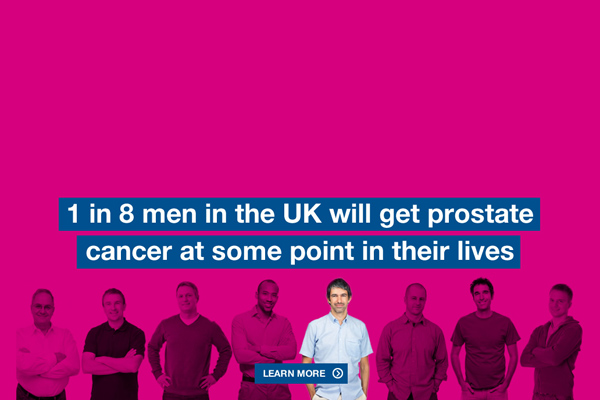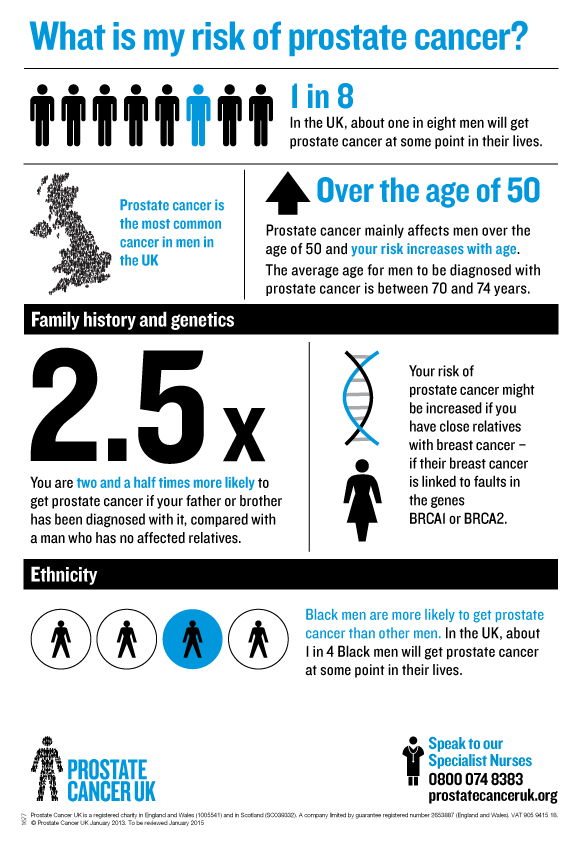
Prostate Cancer Research Centre 2014
Diet Implications for Prostate Cancer
Recent evidence shows that some foods can actually slow the growth of prostate cancer as well as reducing the risks of it coming back once you have had treatment.
Prostate Cancer Infographic

© Prostatecanceruk.org 2014
Links between diet and prostate cancer have been much debated in recent years. The latest advice is that there is evidence to suggest what you eat can help prevent this potentially fatal disease. Prostate cancer is one of the most common cancers amongst men living in the Western world. You can now also get a Prostate home testing kit to put your mind at ease.
Why Is Prostate Cancer Linked to Foods?
It is now believed that the high fat content of the typical Western diet is one contributor to prostate cancer. Prostate cancer is known to be genetic but research has shown that in countries where the overall consumption of saturated fat is high, there are a proportionally higher number of cases of this disease.
What is Your Prostate?
The prostate is a gland that produces prostatic fluid, one of the components of seminal fluid. Symptoms of potential problems in the cells of the gland include the following: lower back pain, pain in the pelvis area, pain while urinating, needing to urinate frequently, difficulties in beginning to urinate and/or breaks in the flow of urine, as well as blood in the urine or semen.
If you suffer from any of the above, you should see your doctor about being screened. The condition is slow developing and treatable if caught early enough. Being aware of how much saturated fat you are consuming is also very important. Red meat is thought to be the main culprit here as it is often very high in saturated fat. Dairy products are also a concern.
Make sure you are eating a balanced diet with plenty of fruit and vegetables as a high fat content also exposes you to heart disease and other life threatening conditions.
What's the Key?
As discussed. the Western diet is higher in saturated fat and therefore thought to have an effect on prostate cancer. Studies have shown that both for men that have a vegetarian diet and for Japanese males the rate of prostate cancers is lowest. The explanation for this could be that both have a very low fat content as well as containing high levels of specific nutrients such as Lycopene and Selenium.
Both the American Institute for Cancer Research and the World Cancer Research Fund believe that these two nutrients are key to helping protect your body against prostate cancer.
Looking at foods specifically, diets that are also very high in Lycopene-containing foods will help protect against prostate cancer according to AICR.
- Guava Fruit - 5204µg per 100g
- Watermelon - 4532µg per 100g
- Cooked Tomatoes - 3041µg per 100g
- Papaya - 1828µg per 100g
- Grapefruit - 1135µg per 100g
- Cooked Sweet Red Peppers - 484µg per 100g
- Cooked Asparagus - 30µg per 100g
- Red Cabbage - 20µg per 100g
- Mango - 3µg per 100g
- Carrots - 1µg per 100g
In Summary
Look out for the key signs of early prostate cancer as per the details above and reduce the amount of saturated fat in your diet. There are ways to improve your diet that will increase the Lycopene - a nutrient known to help prevent Prostate Cancer.
Further Reading
Prostate Cancer UK - http://prostatecanceruk.org
American Institute for Cancer Research - http://www.aicr.org/learn-more-about-cancer/prostate-cancer/
Most Popular
- › Activities for Getting Fit
- › Exercise Helps Weight Loss
- › What is a High Fibre Diet Plan?
- › 5 A Day for Healthy Eating
- › Eating Healthy Foods
- › What Is Diabetes?
- › Your Calorie Intake for Weight Loss
- › Personal Training Workouts
- › Eating Disorders Relating to Weight Loss
- › Drinking Water - The Benefits of Water
You may also be interested in...
What is a High Fibre Diet?
Are you looking for a high fibre diet plan to help feel a bit more healthy? Fibre mean lots of dried fruit and tasty wholemeal pastas and pulses so you won't get bored!High Protein Diet Plans
Looking for good high protein diet plans online is not always easy, but find out more about losing weight and slimming through diet with slimmming.co.ukA High Fibre Diet
Look for what a high fibre diet is and read our simple guide. From high fibre foods through to recipes and tips slimming.co.uk has everything you need.What are Low Fat Diet Plans?
When you’re trying to lose weight, low fat diet plans seem to make a lot of sense – surely eating less fat will make you, well, less fat? Get the low down on these diets now.Fancy a Low Fat Diet?
Learn more about what a low fat diet actually means in reality! If you fancy this route for your slimming program, then read what's involved so you know exactly what you are letting yourself in for.
